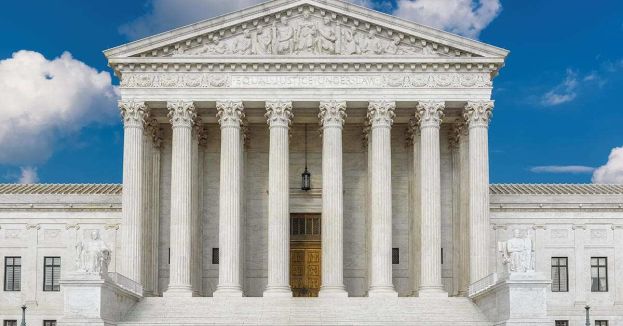In a decision written by Justice Samuel Alito, the court renounced the Environmental Protection Agency's (EPA) expansive interpretation of the Waters of the United States (WOTUS) and ordered a more restricted approach.
The case under review involved Michael and Chantell Sackett, two Idaho residents whom the EPA had barred from constructing a home near a wetland based on the Clean Waters Act (CWA) of 1972. Justice Alito's opinion noted, "The EPA ordered the Sacketts to restore the site, threatening penalties of over $40,000 per day."
According to the EPA, the wetlands on the Sacketts' property were classified as 'waters of the United States due to their proximity to a ditch that drained into a creek, ultimately flowing into Priest Lake, a navigable, intrastate lake. The Sacketts, disputing this classification, took the case to court.
WATCH: 2004 SNL SKETCH: "DONALD TRUMP’S HOUSE OF WINGS”![]()
The Supreme Court's ruling has far-reaching implications for water regulation. It decreed that the federal government must confine its definition of WOTUS to water sources displaying a "continuous surface connection" to significant bodies of water. While the court unanimously agreed on this limitation, the justices were divided, 5-4, on how the federal government should define water sources.
WATCH: ESPN HOST- DEMOCRAT STRATEGY IS NOT WORKING![]()
May 26, 2023
Alito wrote, "Understanding the CWA to apply to wetlands that are distinguishable from otherwise covered 'waters of the United States' would substantially broaden [existing statute] to define 'navigable waters' as 'waters of the United States and adjacent wetlands.'"
WELP, CLIMATE WARRIORS HAVE THEIR NEXT TARGET PICKED OUT...![]()
This decision, which upsets the Biden administration's recently implemented WOTUS regulation, was celebrated by Republican lawmakers and landowners' associations. Months prior, the EPA had finalized and implemented a new WOTUS regulation.
The EPA and the U.S. Army Corps of Engineers made the final announcement quietly on the last working day of 2022. The regulation, which EPA Administrator Michael Regan described as a rule that "safeguards our nation's waters," was set to take effect in March.
TAXPAYER DOLLARS AT WORK: OUTRAGE OVER UC BERKELEY'S TAYLOR SWIFT MARKETING CLASS![]()
The regulation expanded the federal government's reach, extending its authority over wetlands, lakes, ponds, streams, and "relatively permanent" waterways. This interpretation of water sources requiring protection under the CWA echoed a pre-2015 environmental rule implemented during the Obama administration to mitigate water pollution.
DENVER MIGRANT ADVOCATES UNGRATEFULLY DECLARE WE SUCK AT TAKING CARE OF ILLEGALS...![]()
The new regulation was criticized by industry groups, Republican Congress members, and various states, who denounced it as an example of federal overreach. Following a request from 24 states and several trade groups, a federal judge halted the implementation of the regulation in April. Subsequently, the House and Senate endorsed a regulation rejecting the new rule.
TENSIONS BOIL OVER AS PRO-PALESTINE PROTESTERS ARE ARRESTED OUTSIDE TOP DEM LEADER'S HOME![]()
Sen. Shelley Moore Capito, R-W.Va. 's ranking Member of the Senate Environment and Public Works Committee, praised the Supreme Court's ruling. "Today, the Supreme Court sent a loud and clear warning shot to the Biden administration about its attempts to overregulate the lives of millions of Americans," said Capito. "By rejecting the 'significant nexus' test, the Court protected America's farmers, ranchers, builders, and landowners from overreach under the Clean Water Act, and ruled President Biden's recent WOTUS rule goes too far."
WATCH: SENATOR FETTERMAN SLAMS DEMOCRATS OVER 'CRAZY' RESPONSE TO IRAN'S ATTACKS ON ISRAEL![]()
BREAKING: HAMAS RELEASES PROPAGANDA VIDEO FEATURING ISRAELI-AMERICAN HOSTAGE ALIVE...(WATCH HERE)![]()
RESEARCHERS BAFFLED: CUTTING-EDGE AI ALGORITHMS UNVEIL STARTLING POLITICAL INSIGHTS![]()
FIRST FLIGHT OUT: BIDEN'S NEW HAITI POLICY DRAWS WIDE CRITICISM![]()
BIDEN TAKES A JAB AT LAUREN BOEBERT WITH JUST TWO SIMPLE WORDS...![]()
THE FAUCI FALLOUT: RFK JR. BLOWS LID OFF PANDEMIC POWER PLAYS (WATCH)![]()
MONEY TALKS AND BULLSH*T WALKS: COLUMBIA RESPONDS TO ROBERT KRAFT PULLING SUPPORT![]()
WATCH: ALEC BALDWIN'S COFFEE SHOP CLASH GOES VIRAL: THIS WOMAN IS RELENTLESS!![]()
DEMOCRATIC SENATOR'S 'LATE-NIGHT ADVENTURE' LANDS HER IN VERY STICKY SITUATION![]()
GOP FIREBRAND DROPS BOMBSHELL "THEORY" ON HOW TRUMP'S CASE WILL PLAY OUT![]()
VERDICT DRAMA GRIPS ARIZONA: RANCHER'S MURDER TRIAL TAKES UNEXPECTED TURN![]()
Dan Newhouse, R-Wash., Chairman of the Congressional Western Caucus, also hailed the court's decision as a victory for "the Constitution, the American people, and our freedoms" and urged the EPA to revoke its WOTUS regulation officially.








 Discover alternative ideas that will make you think
Discover alternative ideas that will make you think Engage in mind bending debate
Engage in mind bending debate Earn points, rise in rank, have fun
Earn points, rise in rank, have fun


